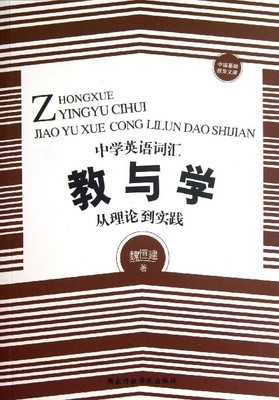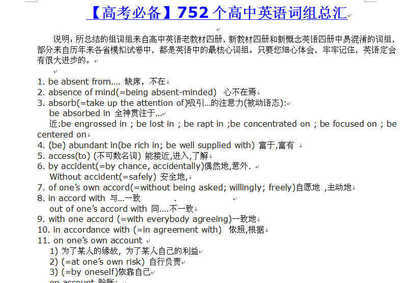实用高中英语短语与句型词典
impress
1. impress sb as… 给某人的印象是……。如:
He impressed me as an honestman. 他给我的印象是很老实。
She impressed me as a woman of greatkindness. 在我的印象中,她是一位非常仁慈的女性。
注:该句型中 as后的情况指的通常是句子主语,而不是impress后的宾语。如:
She impressed me as being very rude.
正:在我的印象中,她很粗鲁。
误:她对我的印象是我很粗鲁。
2. impress sb with sth
(1) 某事给某人留下深刻印象。如:
He impressed me with hiscourage. 他的勇敢给我留下了很深的印象。
They impressed us with theirperformance. 他们的精彩表演给我们留下了很深的印象。
注:有时用 sb is impressed with [by, at] sth这样的被动结构。如以下各句也可说成:
I was impressed with [by, at] hiscourage.
We were impressed with [by, at] theirperformance.
(2) 使某人铭记某事物,向某人强调某事物。如:
I will impress you with onething. 我向你强调一件事。
He impressed me with the importanceof work. 他要我铭记工作的重要性。
注:该结构也可用 impress sth on sb / impress on sbsth表示。如以上两句也可说成:
I will impress one thing on you.
He impressed the importance of workon me. / He impressed
on me the importance of work.
3. impress sth on [upon] sth 把某物印在某物上。如:
He impressed his name on thebox. 他把自己的名字印在盒子上。
His words are strongly impressed onmy memory. 他的话深深印在我的记忆里。
impression
1. beunder the impression 认为,以为。如:
We were under the impression thatthey were brothers. 我们认为他们是兄弟。
He was under the impression that sheliked him. 他以为她喜欢他。
注:不要类似于 in one’s opinion 而说 in one’s impression这样的短语,后者不合英语习惯。
2. givesb an impression 给某人留下印象。如:
He gave her a good impression.他给她留下了很好的印象。
She gave me the impression of a nicegirl. 她给我印象的印象是,她是个不错的女孩。
3. have[get] the impression 有……的印象,记得,认为。如:
I have [get] the impression that hedoesn’t smoke. 我记得他不抽烟。
Everyone had the [an] impression thatshe was a goodmatch for the young man. 每个人都认为她和那个年轻人是天造地设的一对。
4. makean impression on sb (sth) 给某人留下印象,对某人(某事物)起作用。如:
He made a good (bad) impression onthe teacher. 他给老师留下了很好(很坏)的印象。
The rain made little impression onthe dry fields. 这场雨对干旱的田地没起什么作用。
注:有时用动词 leave。如:
The book left [made] a deepimpression on him. 这本书给他留下了深刻的印象。
5. Whatare you impressions about [of]……你对……的看法如何? 如:
What are you impressions about [of]Shanghai? 我觉得上海如何?
What are you first impressions about[of] our school? 我对我们学校的第一印象是什么?
improve
1. improve in sth 在某一方面有所改进。如:
He is improving in health.他的健康状况正在好转。
比较:His health is improving.
2. improve on [upon] 对……改进,比……更好。如:
I’m unable to improve on hissuggestion. 我提不出比他更好的建议了。
He has never improved on his firstbook. 他再也没有写出他的处女作更好的书来。
比较以下各组句子:
He has improved her poem.他已经修改了她的诗。
He has improved on her poem.他写的一首诗比她的诗更好。
The poem cannot be improved.这首诗没有什么可改的地方。
This poem cannot be improvedon. 这首诗已经够好了,再也写不出比这更好的了。
in
2. indoing sth 在……时,在做……的过程中。如:
In doing this, we can improve ourEnglish. 我们这样做时,可以提高我们的英语水平。
You should be very careful inlistening to the teacher. 你在听老师讲课时,应当很仔细。
2. inthat因为,既然。如:
He didn’t come in that he wasill. 他因病未来。
In that he killed the man, he was amurderer. 他既然杀了这个人,他就是凶手。
include
1. include doing sth 包括做某事。如:
My job doesn’t include making coffeefor the boss. 我的工作不包括给老板冲咖啡。
Your duties will include putting thechildren to bed. 你的职责包括照顾孩子就寝。
2. including sth (sb) 包括某人(事物)在内。如:
We all went including me.所有人都去了,包括我在内。
Price $10,including postage.定价10美元,包括邮资。
注:该表达也可说成 sth (sth) included, 所以以上两句也可说成:
We all went me included.
Price $10, postage included.
increase
1. increase by 增加(了多少)。如:
The number increased by 1000.数目增加了1000。
The population of the city hasincreased by 20 per cent. 这个城市的人口增加了百分之二十。
注:该结构中的 increase 是动词,若是用作名词,一般与介词of 连用。所以以上各句也可说成:
The number had an increase of 1000.
The population of the city shows anincrease of20 percent.
2. increase in sth 在某一方面增长。如:
Studnests have increased innumber. 学生人数增加了。
There has been a big increase in roadaccidents. 交通事故增加了很多。
注:该表达中的 increase 可用作动词和名词。
3. increase to 增加到……。如:
His salary has increased to$3000. 他的工资已增加到3000 美元。
The number of the students increasedto 2000. 学生人数增加到了2000人。
4. ontheincrease在不断增加。如:
World population is on theincrease. 世界人口正在增加。
Crime in some big cities is on theincrease. 一些大城市的犯罪率在不断增加。
insist
1. insist on [upon] (doing) sth
(1) 坚持主张某事,坚持要做某事,坚决要求(做)某事。如:
He insisted onthis point.他坚持这一点。
He insisted on seeing us home.他一定要送我们回家。
I insist on your [you] take immediateaction. 我坚决要求你立即采取行动。
(2) 坚持说某情况,坚持认为某情况。如:
I insisted on my correctness.我坚持认为我是正确的。
She kept insisting on herinnocence. 她坚持说她是清白的。
注:suggest 后不直接动名词(即其中的on, upon 不能省略),也不能直接不定式或不定式的复合结构。所以不说:
误:I insist (him) going.
误:I insist (him) to go.
2. insist that-clause
(1) 坚持要做某事。如:
注:用于此义时,从句所指的通常是尚未成为现实的情况,所以从句谓语通常用“(should)+动词原形”这样的虚拟语气形式。
I insisted that he (should)go. 我一定要他去。
She insisted that I (should) stay forsupper. 他一定要我留下吃晚饭。
(2) 坚持认为(说)某情况。如:
I insisted (that) he waswrong. 我坚持认为他错了。
He still insisted he wasn’t there atthe time. 他仍然坚持说他当时不在那儿。
注:用于此义时,从句所指的通常是已经成为现实的情况,所以从句谓语不用“(should)+动词原形”这样的虚拟语气形式,而用陈述语气。
instead
![[转载]实用高中英语短语与句型词典 外刊实用短语句型精选](http://img.aihuau.com/images/02111102/02014430t01c69624490aee34ae.jpg)
1. dosth instead 取而代之去做某事。如:
It will takes days by car, so let’sfly instead. 开车去要好几天,咱们还是坐飞机去吧。
I couldn’t go, so he wentinstead. 我不能去,所以他替我去了。
2. instead of 代替,而不。如:
Will you go to the party instead ofme? 你替我赴宴好吗?
Let’s play cards instead of watchingTV. 咱们打牌吧,别看电视了。
We’ll go there on foot instead of bybus. 我们将步行去那儿而不乘车去。
The situation is better instead ofworse. 形势是更好了,而不是更坏了。
That increased instead of decreasedour courage. 那不但没有减弱反而增强了我们的勇气。
instruction
1. follow the instructions 按说明,按指示。如:
Follow the instructions on the backof the box. 请看瓶子背后的说明。
Failure is impossible if theinstructions are carefullyfollowed. 如果用心按照指示办,就不可能失败。
注:该表达中的 instruction 要用复数;另外有时也用其它动词。如:
Read the instructions on the bottlebefore you take the medicine. 吃药前先看药瓶上的说明。
See instructions on the reverseside. 见背面的说明。
2. onsb’s instructions 按照某人的指示(命令)。如:
It is done on hisinstructions. 这是按他指示办的。
On his instruction the baggage hadbeen sent on. 按照他的指示行李已预先送去。
3. under (sb’) instruction 在(某人的)指导下。如:
He is not yet trained, but stillunder instruction. 他的培训还未结束,还在接受指导。
Under his instruction I slowlymastered the art of glassblowing. 在他的指导下,我慢慢地掌握了吹玻璃的技术。
There are about 500 students underinstruction. 大约有五百学生上课。
interest
1. have(take) (an) interest in 对……有(产生)兴趣。如:
They have a great (much) interest inpoetry. 他们对诗歌很感兴趣。
Babies soon begin to take an interestin the world around them. 婴儿很快就会对他们周围的世界感兴趣。
2. loseinterest in 失去对……的兴趣。如:
He lost interest in is work.他对工作失去了兴趣。
The older ones soon lost interest inthe game. 年纪较大的人很快就对这个游戏失去了兴趣。
3. ofinterest有兴趣,使人感兴趣的。如:
The question is of no interest tous. 我们对这个问题不感兴趣。
It is a question of interest tous. 这是一个我们感兴趣的问题。
He has been to many places ofinterest. 他去过许多名胜。
4. show[express] an interest in 对……表现出兴趣。如:
He has shown an interest in learningFrench. 他已表现出对学法语有兴趣。
No one has expressed an interest inthis so far. 到目前为止还没有人对此表示有兴趣。
5. beinterested in (doing) sth 对(做)某事感兴趣。如:
I’m not interested inpolitics. 我对政治不感兴趣。
They are interested in learningdrawing. 他们对学绘画感兴趣。
6. beinterested to do sth 很想做某事。如:
I’d be interested to hear youropinion about this. 我很想听听你对这事的意见。
I shall be interested to know whathappens. 我很想知道情况会怎样。
introduce
1. introduce oneself 自我介绍。如:
Let me introduce myself: my name is(John) Simpson. 请让我自我介绍一下:我名叫(约翰·)辛普森。
He introduced himself atfirst. 他先作了自我介绍。
2. introduce sb to sb向某人介绍某人。如:
May I introduce you to MissBrown? 让我介绍你与布朗小姐认识好吗?
The teacher introduced a new studentto us. 老师为我们介绍了一位新同学。
注:introduce 通常不带双宾语。如:
让我把我的朋友介绍给你。
正:Let me introduce my friend to you.
误:Let me introduce you my friend.
3. introduce sb to sth 使某人了解(认识、体验)某事物。如:
The teacher introduced the studentsto thepleasure ofreading. 老师让学生们尝到了读书的乐趣。
He introduced us to a new method ofwork. 他使我们了解了一种了新的工作方法。
4. introduce sb (sth) into 把某人(某物)引入(引进)……。如:
He introduced a guest into theparlour. 他把客人引进会客室。
Potatoes were introduced into Europefrom America. 马铃署是从美洲引进欧洲的。
Many new designs have beenintroduced. 已经采用了许多新设计。
invite
1. invite sb to (for) sth 邀请某人(参加)做某事。如:
He invited me to dinner (a party, awedding). 他邀请我参加宴会(晚会,婚礼)。
Why don’t you invite him for a drink(a meal, coffee)? 你为什么不邀请他喝一杯(吃餐饭,喝咖啡)?
2. invite sb to do sth 邀请某人一起做某事。如:
They invited her to go for awalk. 他们请她一起去散步。
We invited him to take part in thecelebration. 我们邀请他一起参加庆祝会。
注:有时若意义明确,可省略不定式。如:
He didn’t invite us (to come)in. 他没有请我们进屋。
He invited us (to come) to aparty. 他邀请我们参加聚会。
另外,有时用于被动语态。如:
We were then invited to sitdown. 然后他们请我们坐下。
He was invited to speak at themeeting. 他被邀请在会上发言。
J
job
1. get[find] a job 找到一份工作。如:
Two years later he still couldn’tfind a job. 两年后他没没有找到工作。
She got a job as a waitress.她找到一份做女招待的工作。
2. takea job 接受一份工作。如:
He took a job at a children’shospital. 他接受了儿童医院的工作。
3. outof a job 失业。如:
He’s been out of a job formonths. 他已失业几个月了。
You’ll be out of a job if you keepcoming late. 你若老是迟到,你会被解雇的。
4. It’s one’s job to do sth 做某事是某人分内的事(职责)。如:
It’s not my job to lock up.上锁不是我分内的事。
It’s your job to teach thechildren. 教这些孩子是你的职责。
5. doa good job 做得好。如:
He did a good job in the exam.他考得很不错。
You’ve done a good job cleaning theclassroom. 你们把教室打扫得很干净。( / D7)
6. It’s quite a job to do [doing] sth 做某事是件费力的事。如:
It’s quite a job to persuade[persuading] her. 我费了不少力才说服她。
It was quite a job finding [to find]his flat. 找到他的寓所可不是件容易的事。
join
1. joinsb in (doing) sth 与某人一起做某事。如:
You go ahead. I’ll join youshortly. 你们先开始,我一会儿就来(一起干)。
Will you join me in a walk?同我一起去散步好吗?
He’ll join us in singing thesong. 他将同我们一起唱歌。
注:该结构有时根据情况可以有以下简化形式:
He joined us soon.他很快就加入我们一起干。
He joined in the game.他参加一起做游戏。
Mary joined in rowing.玛丽参加了一起划船。
2. joinsth to sth 将某物与某物连接起来。如: / D8 / D39)
Join this pipe to the other.把这根管子与那根连接起来。
The island is joined to the mainlandby a bridge. 岛上有座桥与大陆相连。
3. joinup
(1) 参军。如:
Many of them have joined up.他们很多人都已参军了。
He joined up at the age of 18.他18岁参军。
(2) 连接起来。如:
He joined the wires up.他把电线连接起来。
Where do the two roads joinup? 这两条路在哪里交叉?
4. joinwith sb in (doing) sth 同某人一起参加做某事,跟某人合伙做某事。如:
My wife joins with me in sending ourbest regrards toyou. 我妻子和我一起向您问候。
Will you join with me in buying apresent for them? 你要不要跟我合伙买件礼物送给他们?
 爱华网
爱华网



